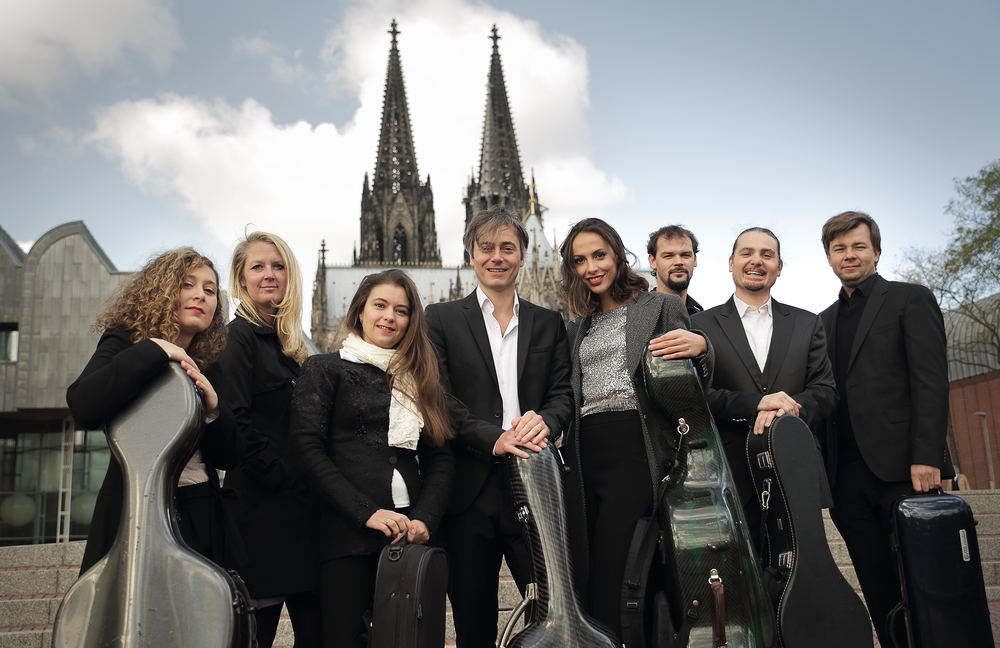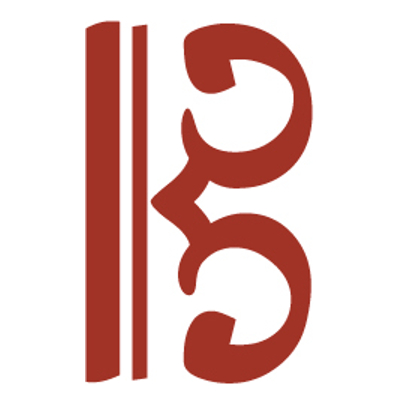The Cologne Classical Ensemble is one of the leading collectives for classical chamber music in North Rhine-Westphalia. Ten musical personalities from North Rhine-Westphalia have come together under the umbrella of the Kölner Klassik Ensemble e.V. The cooperation between the musicians is based on artistic appreciation as well as friendship and collegial solidarity over many years. They are united by the desire to develop demanding music - without external restrictions and only committed to musical quality.
Extraordinary concept
The ensemble pursues a concept that is still unusual in classical music: four different formations are consistently combined under the umbrella of the Kölner Klassik Ensemble e.V. in order to create synergies in cooperation, organization and publicity.
in October 2017 the musicians of the collective founded the supporting association Kölner Klassik Ensemble e.V., in which not only the ensemble members but also the supporting members are organised and which thus provides a firm basis for the musical activities of the ensemble. This creates space and freedom which enables the development of new forms of chamber music, cross-stylistic programmes and new repertoire.
Each musician of the Kölner Klassik Ensemble is thus offered the possibility of the greatest possible development of artistic ideas, without having to forego the quality of many years of collaboration and a fixed organisational framework. This is all the more important because the combination of string instruments and classical guitar in the Kölner Klassik Ensemble per se offers unusual paths away from the established chamber music repertoire. Here it is possible to experiment, to arrange and to compose in a new way. With these approaches, chamber music is gaining in appeal, even among younger listeners. Because transcending styles and genres is an outstanding aspect of securing chamber music as a current art form in the 21st century.
Host of the Chamber Concerts at the Kunstverein
In order to make this special concept tangible to the public and to provide an attractive example of the highly dynamic and extraordinary diversity of contemporary chamber music, the ensemble decided in 2018 to establish its own chamber music series in the Riphahn Hall at Neumarkt in cooperation with the renowned Kölnischer Kunstverein. The aim was to finally offer the independent chamber music scene in Cologne and North Rhine-Westphalia a permanent showcase that would do justice to the high level and international appeal of the top ensembles based here. After two years of intensive preparatory work, the chamber concerts at the Kunstverein began in January 2020. In six concerts spread throughout the year, the programmes show the whole range of today's classical chamber music - namely as a genre-spanning music form from old to contemporary music that has overcome traditional boundaries between classical music, new music, world music and jazz. Priority is given exclusively to demanding programmes with the highest level of artistic engagement and space for developing new ensemble formations and repertoire. The special focus is on ensembles from Cologne and North Rhine-Westphalia that are at a top level and can present their skills here in a setting appropriate to them.
Establishment at a high level
Despite the extraordinary difficulties during the Corona pandemic, the team around artistic director Tobias Kassung succeeded in establishing the chamber concerts at the Kunstverein at a high level, thus striking a real nerve in the city's musical life.
The openness and networking of the concert series with the professional chamber ensembles of the city and NRW has a real model character. As the initiator of the Cologne Classical Music Initiative (IKK), the ensemble is an important player in the network of the Cologne music scene and is in constant exchange with politicians and administrators. Through this initiative, the focus is placed on cooperation with the local and young scene from the outset. This creates a real showcase for the new, international top chamber music that is based in Cologne and NRW.
Another big difference between this concert series and many others is that the Kölner Klassik Ensemble, an active music ensemble, organises and curates this series as a collective. The "chamber music collective" invites colleagues "to join them". And this directness and familiarity is transferred to the audience and the participating ensembles. For the audience, this gives the series a personal face, they quickly feel connected and trust the good programme selection. The invited ensembles, in turn, feel comfortable because they work together as colleagues at eye level and take special care that the musicians involved can present themselves in their best way. This "we-feeling" supports the development of a networked independent classical music scene in Cologne, which can thus connect more closely with the city society.
On 4 February 2023, the Cologne Classical Ensemble celebrated its 20th anniversary in front of an enthusiastic audience in the sold-out Riphahn Hall. The ensemble performed with tremendous musicality and perfection, driven again and again by the magnificent performances of the two soloists Alexander Prushinskiy and Arsenis Selalmazidis.
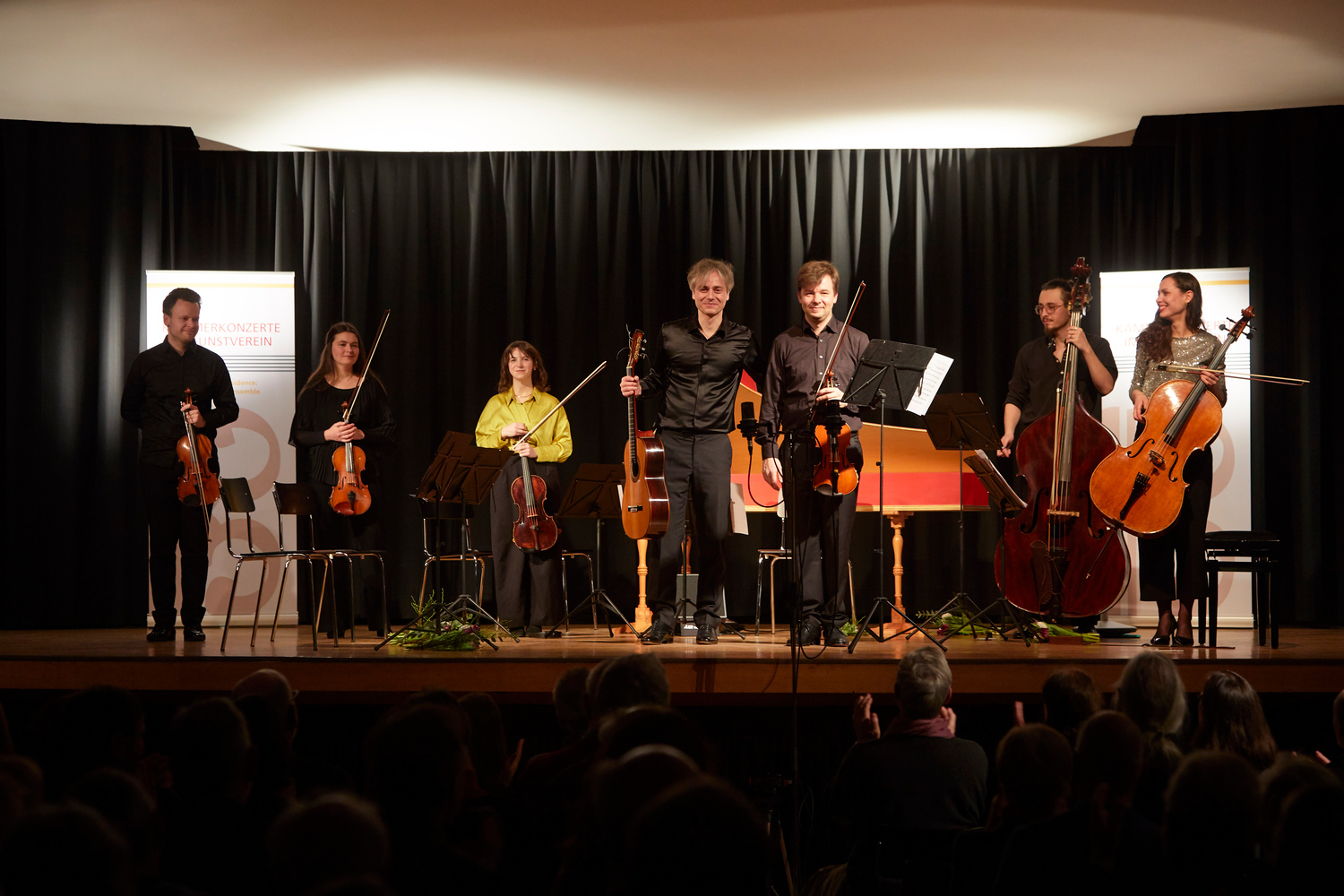
The years: 2003-2007
The Cologne Classical Ensemble was founded in 2003 by students from the Cologne University of Music (Hochschule für Musik Köln). In these first years a fresh and relaxed approach to music was in the foreground. The young ensemble created an unmistakable style with their own arrangements and special line-up, organized many concerts under their own direction and toured Denmark and Sweden in the summer of 2003 with more than 20 concerts. Over 30 appearances in Germany, Denmark, Sweden, Switzerland and Japan followed annually.
During these first years the Cologne Classical Ensemble soon developed an excellent reputation for its arrangements of the music of Astor Piazzolla. The examination of the works of the great Argentine was followed by the highly acclaimed recording for Sony Classical with his music. The years from 2003 to 2006 were characterized by the line-up, which was quite unusual with three violins, viola, cello, double bass, guitar and piano, but the repertoire offered many possibilities, from baroque concerti to romantic works by Dvorak and Tchaikovsky to Astor Piazzolla offered. The musical range had been continuously expanded. The mere fact that the ensemble also worked with a guitarist opened up musical styles from the outset that also belong to the classical guitar: Italian and Spanish composers such as Luigi Boccherini, Mauro Giuliani, Mario Castelnuovo-Tedesco or Joaquin Rodrigo. These first years were also shaped by great, young musicians who made up the face of the ensemble during this time: In addition to the artistic director Tobias Kassung, these were primarily the violin soloists Irakli Tsadaia and Alexander Prushinskiy, the violinists Maike Schmersahl, Anastasia Pylatyuk and Alissa Margulis, the cellist Heike Schuch, the altist Aliaksandr Senazhenski, the double bassist Georgi Berov and the pianist Natasha Majer. These musicians are still close today and meet for joint concerts.
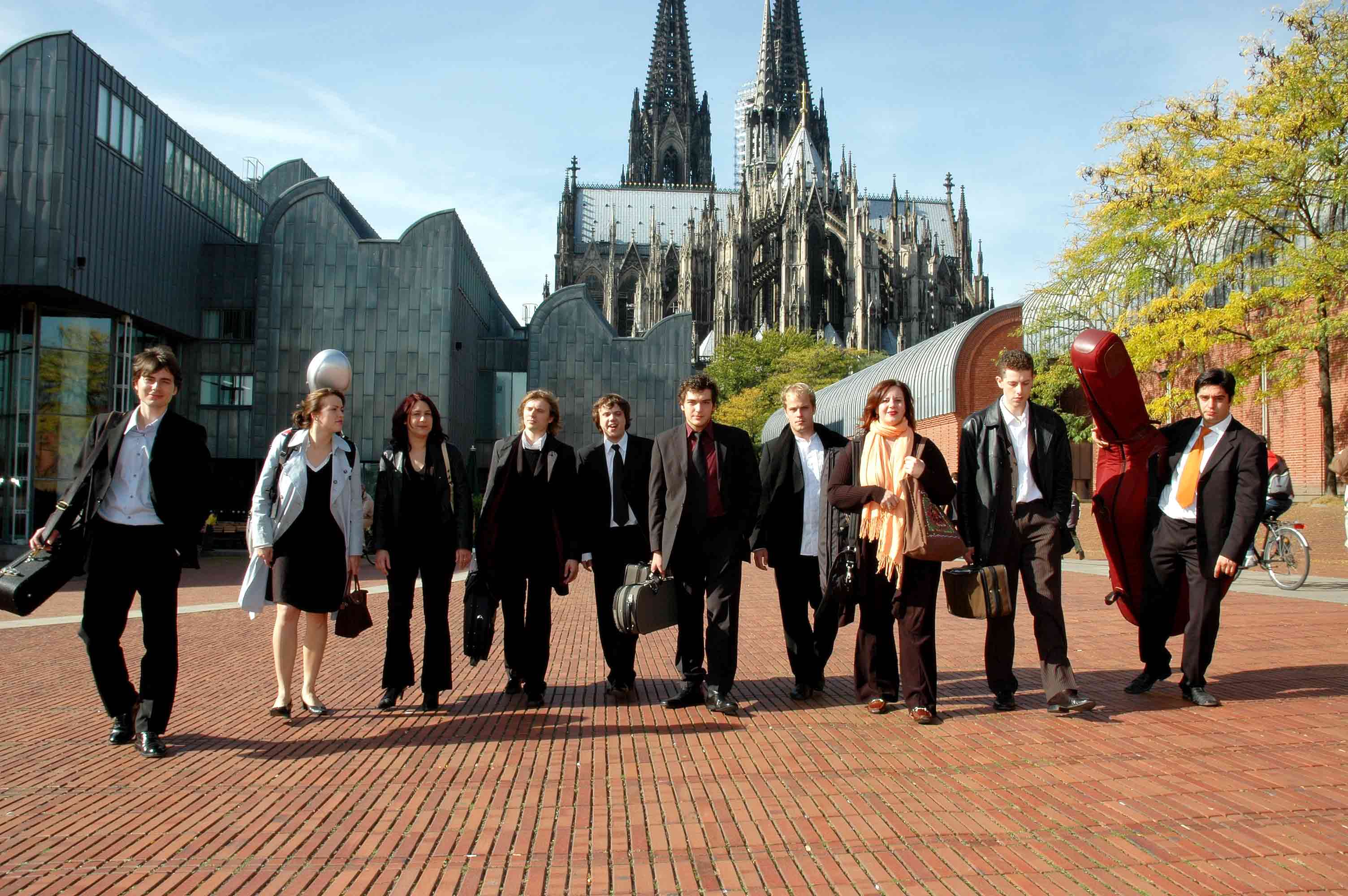
The Cologne Classical Ensemble in October 2006
The years 2008-2018
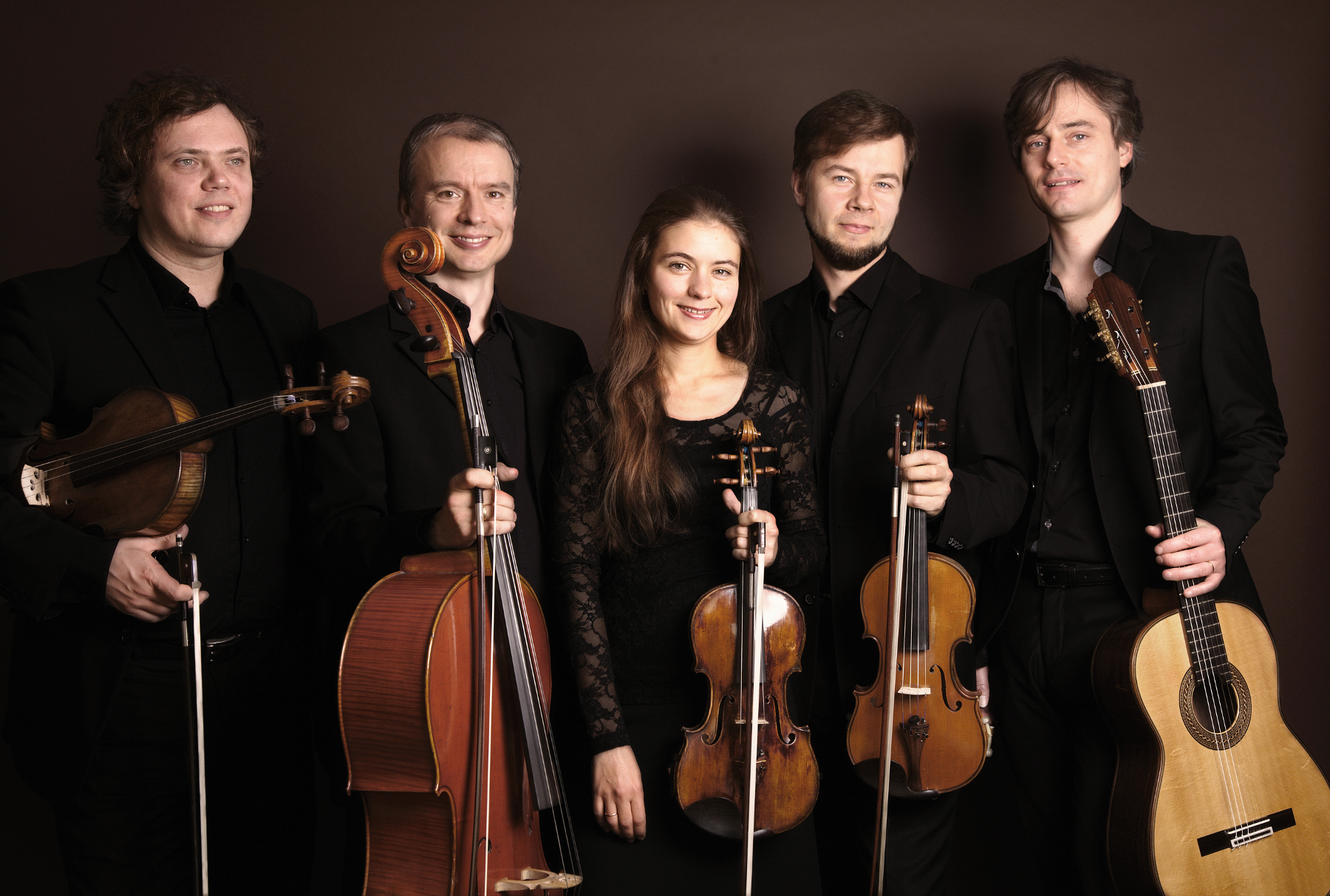
Members of the Cologne Classical Ensemble in November 2015
From 2008 on was established within the Cologne Classical Ensemble first the Astor Trio and later the Arisva Quartet. These two fixed chamber ensembles formed the basis for the later concept of the entire Cologne Classical Ensemble: to form a stage for the musicians, on which they can implement joint projects free from external constraints, completely devoted to the depth of their musical expression. In addition to the artistic direction of Tobias Kassung the musical direction of concertmaster Alexander Prushinskiy developed into one of the main pillars of the ensemble. The success proof how well this unique concept works out. Programs such as the extraordinary Astor Trio have played in the elite of German chamber music. They show how important it is to support each other and work in an atmosphere of freedoms that is needed to bring truly new and great art on the stage.

